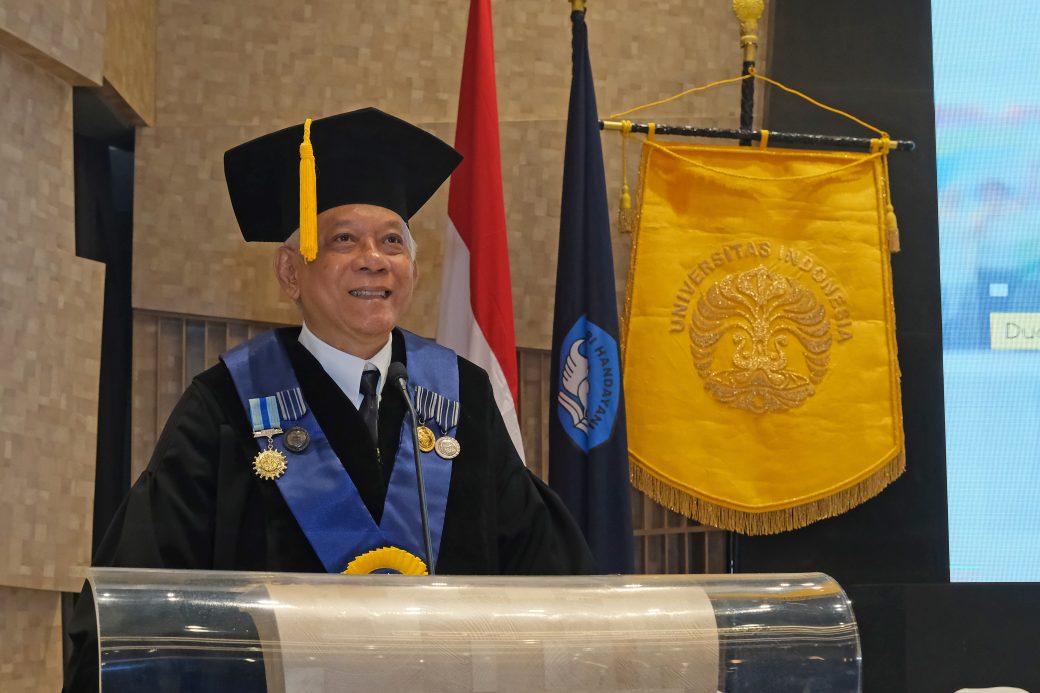The Rector of Universitas Indonesia (UI), Prof. Ari Kuncoro, S.E., M.A., Ph.D, inaugurated Prof. Dr. Ir. Hendri Dwi Saptioratri Budiono, M.Eng. IPM as Professor in the Science of Manufacturing Product Complexity, Faculty of Engineering (FT) UI. The inauguration ceremony, held on Wednesday (26/7) at the Makara Art Center UI Depok Campus, was also attended by Saleh Husin, S.E., M.Si., Minister of Industry for the 2014-2016 period as well as Chair of the 2019-2023 Board of Trustees.
In his speech entitled “The Complexity of Manufacturing Products Towards Human-Less Process”, Prof. Hendri said that the manufacturing industry is an industrial sector that makes the largest contribution to the Indonesian economy. The manufacturing industry sector is expected to drive Indonesia’s economic growth to achieve an average growth target of 6% per year in the next five years. The role of the manufacturing industry in the records of the Central Statistics Agency (BPS) is still the largest in 2022, with its portion reaching 18.34% of the Gross Domestic Product (GDP).
The manufacturing industry cannot be separated from market uncertainty, technological innovation trends, dynamic environmental conditions, market globalization, competition, and changing customer needs. As the industry develops, challenges in the manufacturing environment also increase, one of which is the complexity of manufacturing products. Manufacturing product complexity management is a strategic issue that companies need to address. Complexity development is the manufacturing industry’s path towards the concept of a human-less process.
The human-less process is intended to make the manufacturing process involve fewer humans, especially in determining product costs in the early stages of design. This concept is bridged by the complexity index analysis of various manufacturing product designs. Conventionally, cost estimation is done by looking at the volume, weight, and material of a design. With the development of manufacturing science, it is known that there are many other aspects involved in the production cost of a product.
To support the concept of smart factories and human-less processes, additive manufacturing (AM) technology, also known as 3D printing, can be utilized as a manufacturing technology. The emergence of AM technology changes the mindset that higher complexity will not make the manufacturing process complicated. This has led to research that correlates the complexity index with various process challenges in AM, such as disassembly, recycling, and maintenance.
AM brings significant innovations in the production of items with diverse levels of complexity, both in terms of shape and material. AM has become a significant manufacturing solution in various industries, such as automobiles, aerospace, and construction. The global market size of the AM industry continues to increase, and technology has presented opportunities for innovative designs and better product performance.
The application of Industry 4.0 and Machine Learning technologies in AM has played a role in addressing system complexity, improving product quality, and driving innovation in production.
However, these changes have also affected the role of operators in the manufacturing industry. In the Industry 4.0 era, the role of operators is changing to become more responsible for complex production and decision-making, while simpler manual tasks tend to be automated.
On the other hand, the importance of disassembly and recycling in the design process, as well as attention to environmental design, recyclability and product lifecycle, are the focus of research in sustainability. Production with high recyclability and design for recycling (Design for Assembly/Disassembly or DFAD) helps reduce contamination and maintain the sustainability of natural resources.
“The development of the concept of complexity towards human-less processes will continue to grow with various developments. Each technological development certainly has its advantages, weaknesses, and complexities. AM with its advantages has complexity in terms of disassembly, recycling, and maintenance which is a challenge for further study. All the explanations made in this research will hopefully be useful for the development of the manufacturing industry in the future,” said Prof. Hendri closing his speech.
Prof. Hendri’s research is one of the many researches he has done. Some of his published papers include the Development of the Indonesian Coffee Roasting Process Complexity Calculation Model Towards the Automation System (2023); Power Requirement and Cost Analysis of Electric Bus using Simulation Method with RCAVe-EV1 Software and GPS Data; A Case Study of Greater Jakarta (2022); and Development of A Process Complexity Index of Low-Pressure Die Casting for Early Product Design Evaluation (2022).
Prof. Dr. Ir. Hendri Dwi Saptioratri Budiono, M.Eng. IPM completed her Bachelor of Mechanical Engineering at FTUI in 1985; Master of Engineering in Mechanical Engineering, Keio University, Japan in 1993; FTUI Mechanical Engineering Doctoral Program in 2014; and FTUI Professional Engineer Program in 2023. Prof. Hendri has served as Dean of FTUI for the period 2018-2022.
***
Bureau of Public Communication
Faculty of Engineering, Universitas Indonesia

